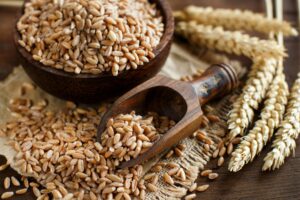In our relentless, fast-paced world, our health frequently finds itself relegated to the backseat, overshadowed by the demands of daily life. Yet, amidst the myriad health concerns we face, chronic inflammation emerges as a silent adversary, profoundly impacting our well-being. This paradox of inflammation—vital for our healing yet capable of causing significant harm when chronic—highlights the crucial role of top anti-inflammatory food in managing our health.
The foods we consume can significantly sway the balance, exacerbating or alleviating inflammation. The integration of anti-inflammatory foods into our daily regimen presents a viable, effective strategy to control and mitigate the adverse effects of chronic inflammation. By selecting these foods judiciously, we can address specific health issues and forge a path towards a vibrant, disease-free existence. The pursuit of the most anti-inflammatory meal transcends mere dietary preference—it embodies a journey toward enhanced health and longevity.
Understanding Role of Top Anti-inflammatory Food
Inflammation is the body’s innate alarm system, a vital call to action in the face of perceived threats. This complex biological response is crucial for our survival, aiding in healing and protection against infections or injuries. However, not all inflammation serves our health; it is divided into two main types: acute and chronic. In stark contrast, chronic inflammation is a stealthy and prolonged response that can remain undetected until it surfaces as a component of various diseases.
Chronic inflammation is intricately linked to numerous health complications, making its management a critical aspect of maintaining health. The risks associated with chronic inflammation are significant, contributing to the development of heart disease, diabetes, and arthritis, among other conditions. This connection underscores the importance of effective management strategies to mitigate these risks.
Pro-inflammatory Foods
Diet plays a pivotal role in the management of inflammation. Foods classified as pro-inflammatory—such as refined carbohydrates, fried foods, sugary beverages, and red and processed meats—can trigger or exacerbate inflammation. Conversely, an anti-inflammatory diet, rich in antioxidants, phytonutrients, and omega-3 fatty acids, can significantly reduce inflammation levels. These nutrients are known for their ability to dampen the inflammatory process, offering a protective shield against chronic diseases.
Understanding the impact of dietary choices on inflammation is crucial for managing and potentially reducing associated health risks. By prioritizing the consumption of whole, nutrient-dense foods and minimizing the intake of processed and unhealthy options, individuals can profoundly influence their health trajectory. Making informed dietary decisions is essential in the fight against chronic inflammation, highlighting the critical importance of diet in managing inflammation.
The Anti-Inflammatory Diet
An anti-inflammatory diet is more than a mere eating plan; it’s a strategic approach designed to reduce inflammation and promote overall health. This diet emphasizes whole, nutrient-rich foods known for their anti-inflammatory properties and recommends minimizing the intake of foods that can trigger inflammation. Understanding the key principles and food groups that make up this diet is crucial for anyone looking to mitigate inflammation and enhance their well-being.
Key Principles of Top Anti-Inflammatory Food:
Adhering to the core principles of an anti-inflammatory diet is pivotal for managing inflammation effectively. This dietary approach emphasizes:
Emphasis on Whole Foods as Top Anti-inflammatory Food:
Shifting the focus to whole foods, loaded with antioxidants, vitamins, and minerals, is instrumental in lowering inflammation levels in the body. This strategy not only promotes overall health but directly combats the inflammatory process.
Incorporation of Healthy Fats
The role of omega-3 fatty acids in mitigating inflammation cannot be overstated. Foods like fatty fish, flaxseeds, and walnuts stand out as critical components of an anti-inflammatory diet due to their rich omega-3 content. These healthy fats are acknowledged for their potent anti-inflammatory capabilities.
Variety in Fruits and Vegetables:
Ensuring a diverse intake of fruits and vegetables enriches the diet with an array of antioxidants and phytonutrients. This variety is not just about color and flavor; it encompasses a broad spectrum of nutrients essential for fighting inflammation. From the deep blues of berries to the vibrant greens of kale and spinach, each color represents unique anti-inflammatory compounds that contribute to health and wellness.
Adapting these principles within your dietary habits fosters a robust defense against inflammation. By prioritizing whole foods, enriching your diet with healthy fats, and embracing the nutritional diversity offered by a wide range of fruits and vegetables, you lay the foundation for a lifestyle characterized by reduced inflammation and enhanced health. This approach not only addresses the immediate effects of inflammation but also contributes to long-term well-being and disease prevention.
Groups Integral to Top Anti-Inflammatory Food:
- Fruits and Vegetables: Especially those rich in antioxidants and vitamins, like berries, leafy greens, and cruciferous vegetables.
- Whole Grains: Such as oats, brown rice, and quinoa, which are high in fiber and can help reduce inflammation.
- Healthy Fats: Sources include olive oil, avocados, and seeds, known for their anti-inflammatory properties.
- Lean Proteins: Focusing on plant-based proteins and fatty fish to reduce intake of pro-inflammatory fats found in red meat.
- By incorporating these food groups into your diet, you can create a powerful, natural defense against inflammation. This dietary approach addresses the symptoms associated with chronic inflammation. Also, it targets its underlying causes, offering a comprehensive strategy for health optimization.
The Champion of Top Anti-Inflammatory Food:
- While many foods boast anti-inflammatory properties, one stands out above the rest: Omega-3 rich fatty fish. Salmon, mackerel, and sardines are widely regarded as the champions of anti-inflammatory foods. It is so due to their high content of omega-3 fatty acids. These essential fats are not only critical for brain health and heart health but also for their potent anti-inflammatory effects.
- Research has consistently shown that omega-3 fatty acids can significantly reduce the inflammatory molecules and substances. These include substances like eicosanoids and cytokines. Studies have linked the regular consumption of omega-3 rich foods with reduced markers of inflammation. It also leads to a lower risk of diseases associated with chronic inflammation, such as heart disease, arthritis, and Alzheimer’s disease.
The inclusion of omega-3 rich fatty fish in your diet can offer a powerful means to combat inflammation and promote overall health. Their unmatched anti-inflammatory potential makes them a cornerstone of any anti-inflammatory diet, underscoring the importance of dietary choices in managing inflammation.
How This Food Fights Inflammation
Omega-3 fatty acids, particularly EPA and DHA found in fatty fish, combat inflammation through several mechanisms:
- Reducing the production of inflammatory eicosanoids and cytokines: Omega-3s interfere with the inflammatory pathways, decreasing the production of substances that promote inflammation.
- Enhancing cell membrane health: Omega-3 fats are incorporated into cell membranes, improving their function and reducing inflammatory responses.
Incorporating omega-3 rich fish into your diet not only provides these direct anti-inflammatory benefits but also contributes essential nutrients that support overall health, making it a key component of an anti-inflammatory lifestyle.
Incorporating the Superfood into Your Diet
Adding omega-3 rich fatty fish to your daily meals offers a straightforward strategy to harness the anti-inflammatory benefits of this nutritional powerhouse. Whether through grilling, baking, or steaming, these fish can be prepared in a variety of ways that preserve their health benefits and enhance their natural flavors.
Creative Ways to Enjoy Omega-3 Rich Fatty Fish:
- Grilled Salmon with Herbs: Season a salmon fillet with herbs and lemon juice before grilling to perfection.
- Sardine Avocado Toast: Mash avocado on whole-grain toast, topping it with sardines for a quick and nutritious meal.
- Mackerel Salad: Flake cooked mackerel over a bed of leafy greens, adding a vinaigrette dressing for a light, anti-inflammatory lunch.
These meal ideas not only add variety to your diet but also ensure you’re getting a significant dose of omega-3 fatty acids essential for combating inflammation.
Supporting Your Diet with Other Anti-Inflammatory Foods:
While omega-3 rich fatty fish takes the spotlight in fighting inflammation, a balanced diet with a variety of other anti-inflammatory foods further enhances your body’s ability to combat inflammation. Here’s a list of foods that complement the anti-inflammatory effects of omega-3 rich fish:
- Berries: Strawberries, blueberries, and raspberries are loaded with antioxidants that help reduce inflammation.
- Leafy Greens: Spinach, kale, and other green vegetables offer vitamins and minerals essential for reducing inflammation.
- Nuts and Seeds: Almonds, walnuts, chia seeds, and flaxseeds provide additional healthy fats and fiber.
- Whole Grains: Foods like quinoa, brown rice, and oats are high in fiber, which supports a healthy inflammatory response.
- Spices and Herbs: Turmeric, ginger, and garlic are known for their potent anti-inflammatory properties.
A diet diverse in these foods ensures a broad spectrum of nutrients and compounds working synergistically to reduce inflammation and promote health.
Enhancing Anti-Inflammatory Efforts Through Lifestyle Choices
A comprehensive approach to mitigating inflammation extends beyond the realm of diet alone. Integrating healthy lifestyle practices plays a pivotal role in augmenting the anti-inflammatory benefits of a well-curated diet, laying the foundation for sustained health and vitality. Essential lifestyle elements that significantly impact inflammation include:
Consistent Physical Activity:
Engaging in regular exercise is paramount for lowering inflammation levels and fostering robust health. Activities ranging from brisk walking to cycling, swimming, or participating in group sports not only enhance cardiovascular health but also initiate anti-inflammatory responses within the body.
Prioritizing Restorative Sleep:
Ensuring quality sleep on a nightly basis is indispensable for the body’s ability to repair and regulate inflammation. The restorative power of sleep cannot be overstated, with 7-9 hours per night recommended for adults. Sleep hygiene practices, such as maintaining a regular sleep schedule and creating a calming bedtime routine, are critical for enhancing sleep quality and, in turn, managing inflammation.
Effective Stress Reduction:
Chronic stress is a known contributor to inflammation. Adopting stress-reduction techniques, such as mindfulness meditation, yoga, or focused breathing exercises, can significantly alleviate stress and its inflammatory effects. These practices not only soothe the mind but also positively influence physiological processes, reducing the body’s stress-induced inflammatory reactions.
Adopting a holistic approach that marries dietary excellence with these key lifestyle modifications constitutes the most comprehensive defense against chronic inflammation. This multifaceted strategy targets inflammation at its source. It also promotes an overarching sense of well-being, enabling individuals to achieve and maintain optimal health.
Embracing this integrated approach underscores the importance of viewing health through a wider lens. It recognizes that true wellness arises from a harmonious balance between what we eat and how we live. By aligning our dietary choices with supportive lifestyle habits, we unlock the full potential for a life free from the constraints of inflammation. It is characterized by vitality, resilience, and longevity.
FAQs about Top Anti-Inflammatory Food
Addressing frequently asked questions can clarify common concerns and highlight the importance of anti-inflammatory foods and lifestyle choices in managing inflammation.
Q: What is inflammation, and why is it harmful?
A: Inflammation is the body’s natural response to protect itself against harm. While acute inflammation is beneficial, chronic inflammation can lead to various health issues, including heart disease, diabetes, and arthritis, making its management essential for long-term health.
Q: Why is omega-3 rich fatty fish considered the best for fighting inflammation?
A: Omega-3 rich fatty fish is highly regarded for its potent anti-inflammatory properties, primarily due to the presence of EPA and DHA. These omega-3 fatty acids are known to significantly reduce the production of inflammation-promoting substances in the body, offering a natural means to combat chronic inflammation.
Q: How quickly can I see results from an anti-inflammatory diet?
A: The time it takes to see results from an anti-inflammatory diet can vary. Some individuals may notice improvements in symptoms and well-being within a few weeks, while for others, it might take longer. Consistency and a holistic approach are key to realizing the diet’s full benefits.
Q: Can lifestyle changes enhance the effects of an anti-inflammatory diet?
A: Absolutely. Combining an anti-inflammatory diet with healthy lifestyle choices, such as regular exercise, adequate sleep, and stress management, can amplify the benefits and contribute to a comprehensive strategy for reducing inflammation and improving overall health.
Conclusion
Embracing an anti-inflammatory diet, highlighted by the inclusion of omega-3 rich fatty fish and a variety of other top anti-inflammatory food, stands as a potent strategy against chronic inflammation. This approach, enriched by the integration of healthy lifestyle practices, offers a holistic path to managing inflammation. The journey to reducing inflammation through diet and lifestyle is both personal and impactful. It offers profound benefits for health and well-being.
Adopting this comprehensive approach not only addresses the symptoms associated with chronic inflammation but also targets its underlying causes. It paves the way for a life characterized by improved health, reduced disease risk, and enhanced vitality, affirming the adage that food truly is the best medicine.
In conclusion, the quest for the number one food that kills inflammation reveals a deeper truth: no single food can accomplish this feat alone. Instead, a synergistic approach, combining the best of anti-inflammatory foods with healthy lifestyle choices, holds the key to effectively managing inflammation and achieving optimal health.



